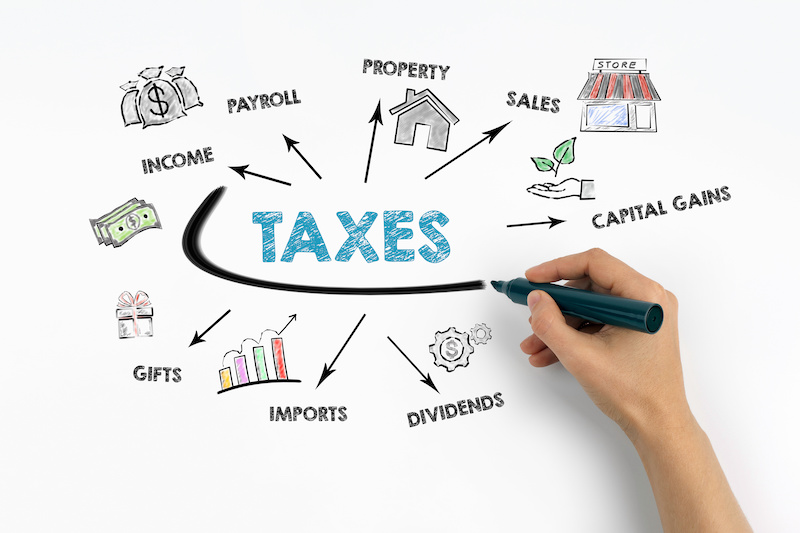 Author: Robert Chapman, CPA, PFS, CMA
Author: Robert Chapman, CPA, PFS, CMA
Many newly-minted day traders racked up huge gains in 2020 and 2021, but recently the market has turned on the same stocks that provided such eye-popping returns. Taxes are involved in every facet of life.
Did you set aside some of your gains for taxes?
Every financial advisor in Pittsford, NY, will probably agree: tax planning is a crucial, but often ignored, part of your financial plan. Can you answer this question? In what tax bracket are you for 2022?
It’s the end of the tax year, and the taxman wants his cut from your investment gains; yes, even the cryptocurrency, and there’s no avoiding your obligation.
However, you can reduce your tax bill with some planning and forethought. Many new investors who rode high-flying growth stocks to riches are in for a rude awakening if they were active traders creating taxable events throughout the year.
Don’t neglect tax planning if you want to preserve your wealth.
Tax Prep vs. Tax Planning
Tax planning and tax preparation sound similar, but these aren’t interchangeable services. Tax prep is what H&R Block and TurboTax do: help people file their annual tax returns with federal, state, and local governments.
Filing your annual taxes can feel like a pain, especially if you account for different income streams and assets. Tax prep is an essential service, but it’s not as in-depth as tax planning.
Tax planning isn’t just something you do once a year; it’s an ongoing process to reduce your tax burden to the absolute minimum. You can’t avoid the IRS, but you don’t need to overpay.
Tax planning isn’t avoidance, and you’re asking for trouble if you don’t give the government their cut. Tax planning is used to map out your asset allocation and capital deployment in the most efficient manner.
Tax Planning Strategies for the Wealthy
 High-net-worth individuals and families don’t have access to the tax advantages of popular retirement accounts like IRAs. But that doesn’t mean all tax breaks are off the table if you’re a high earner.
High-net-worth individuals and families don’t have access to the tax advantages of popular retirement accounts like IRAs. But that doesn’t mean all tax breaks are off the table if you’re a high earner.
Here are a few ideas:
Health Savings Account (HSA)
An HSA is a tax-deferred account meant for medical expenses. As a healthy young person, you may not need an HSA, but as retirement age creeps closer, so does the certainty of a medical event. A HSA is an extra vehicle for tax-deferred savings, and there’s no income restriction like there is with a Roth IRA.
As long as the funds are used for qualified medical expenses, you can avoid taxes altogether. The contribution limit for an HSA in 2022 is $3,650 for individuals and $7,300 for families.
Smart Investing
Investing early is always good advice, but investing wisely will keep your gains in your own hands. For example, tax-loss harvesting (selling losing stocks to match gains from winners) can offset your tax liability. Additionally, you can choose which individual shares to sell, called Tax Lot ID, from your investment accounts to guarantee you’re selling the shares you’ve held the longest.
Another tax efficiency trick is to use passively-managed ETFs instead of mutual funds, avoiding capital gains distributions and having much less turnover.
Buy Solar
Have you been thinking about utilizing solar power for your home or business? If you’re facing a high tax bill, you can reduce your obligation by purchasing and installing solar energy equipment.
The Investment Tax Credit (ITC) offers a 26% credit on solar systems established between 2020 and 2022, although this drops to 23% in 2023.
Increase Giving and Charitable Donations
Giving to charity is an investment in the public good and can reduce your tax bill. The gift tax exclusion allows for a $15,000 gift to separate individuals each year, meaning no one will face a tax bill.
Tax-Smart Retirement Investment Accounts
Retirement accounts like 401(k) plans and IRAs are excellent vehicles for deferring taxes later or eliminating them in the case of the Roth. But since a 401(k) and Roth IRA have different tax advantages, it makes sense to split your assets into the accounts that provide the most tax savings.
The goal shouldn’t have to have a balanced portfolio in all retirement accounts but a balanced portfolio across your retirement accounts. Here’s how.
401(k)
The standard retirement plan offered by most American businesses, the 401(k), is a tax-deferred account that allows $20,500 ($27,000 if age 50+) for 2022 in contributions annually. Taxes on capital in this account are deferred until withdrawal, and withdrawals can’t be made until age 59.5 (with a few exceptions).
Since a 401(k) account will eventually face a tax bill, it’s a good idea to make sure you’re paying capital gains taxes and not income taxes on the investments in this account. Mutual funds that track high-growth sectors are ideal 401(k) investments.
Traditional IRA
A traditional IRA has the same tax break as a 401(k), although the annual limits are much lower ($6,000 in 2022 and/or $7,000 if age 59+). However, an IRA has a much more comprehensive range of investment choices, so if your 401(k) is primarily in mutual funds, your IRA can be used to purchase individual stocks if you have risk tolerance.
Roth IRA
Unlike a traditional IRA or 401(k), a Roth is funded with after-tax dollars, and investments grow tax-free. If you invest $100,000 in stocks, any gains on that initial capital can’t be touched by the IRS, as long as you withdraw accordingly.
This makes a Roth IRA ideal for income-producing assets like bonds and dividend stocks. Roth IRAs also aren’t subject to RMDs so that all money can be kept in the account in perpetuity.
Other (Back-Door)
If you have a modified adjusted gross income (MAGI) over $140,000 in 2021, you can’t contribute to a Roth IRA. However, you can make a backdoor Roth IRA conversion to get some capital into an account that grows tax-free.
To use this strategy, you’ll need to make a non-qualified (not tax-deductible) contribution to a traditional IRA and convert that balance into a Roth IRA. This must be done immediately, and it’s easier to use the same brokerage account provider for both.
Treat your different retirement accounts as parts of the same whole. Use tax-efficient investments in taxable accounts and tax-inefficient investments in your retirement accounts.
Tax Planning for Real Estate Investors
 Real estate investing is a great way to build wealth slowly over time, but real estate also has confusing tax rules. Here are some things to keep in mind if you’re a landlord or real estate investor.
Real estate investing is a great way to build wealth slowly over time, but real estate also has confusing tax rules. Here are some things to keep in mind if you’re a landlord or real estate investor.
Flipping
Some real estate investors prefer to fix properties and flip them for profit. Several tax advantages exist for flippers, such as the ability to avoid taxes on a 1031 or ‘like-kind exchange’ by using earnings from home to purchase another home.
Be sure to hold the property for longer than a year so you can take advantage of the capital gains tax rate.
Maximize Your Deductions
Owners of residential real estate have a variety of tax deductions at their disposal, including interest, insurance premiums, deprecation, repairs, and costs for independent contractors. You can even write off the gas mileage you incur driving back and forth from your properties!
Life Estate
Life-long vows aren’t just for marriage; they’re also for owning property. With a life estate, you can assign joint tenancy to a home and allow that property to pass onto the second owner (known as the remainderman) upon your death.
This can only be done with your primary residence, but it allows you to pass a home onto your children or heirs without putting it into your will and facing probate court.
Hire a Financial Advisor
Tax planning is a complicated process, and it’s usually a good idea to enlist some help. A financial advisor who’s well-versed in tax laws can be a trusted confidant over the years as you try to maximize your nest egg while avoiding unnecessary taxation.
A fiduciary is a financial advisor like a CPA or CFP bound by a strict ethical code to put client interests first. With a fiduciary advisor, you can be sure to get the best recommendations on asset allocation and investments while also maximizing your tax credits and deductions.
Plus, there’s the peace of mind of knowing your finances are in good hands, and that alone is worth an incalculable amount.
It’s never too late to start Tax Planning with a Comprehensive Financial Plan.
Securities offered through Cetera Financial Specialists LLC (doing insurance business in CA as CFGFS Insurance Agency), member FINRA/ SIPC. Advisory services offered through Cetera Investment Advisers LLC. Cetera entities are under separate ownership from any other named entity. Home offices at 1450 American Lane, Ste 650, Schaumburg, IL 60173; phone 888.528.2987.
For a comprehensive review of your personal situation, always consult your tax and/or legal advisor. Neither Cetera Financial Specialists LLC nor any of its affiliates offer tax or legal services.
